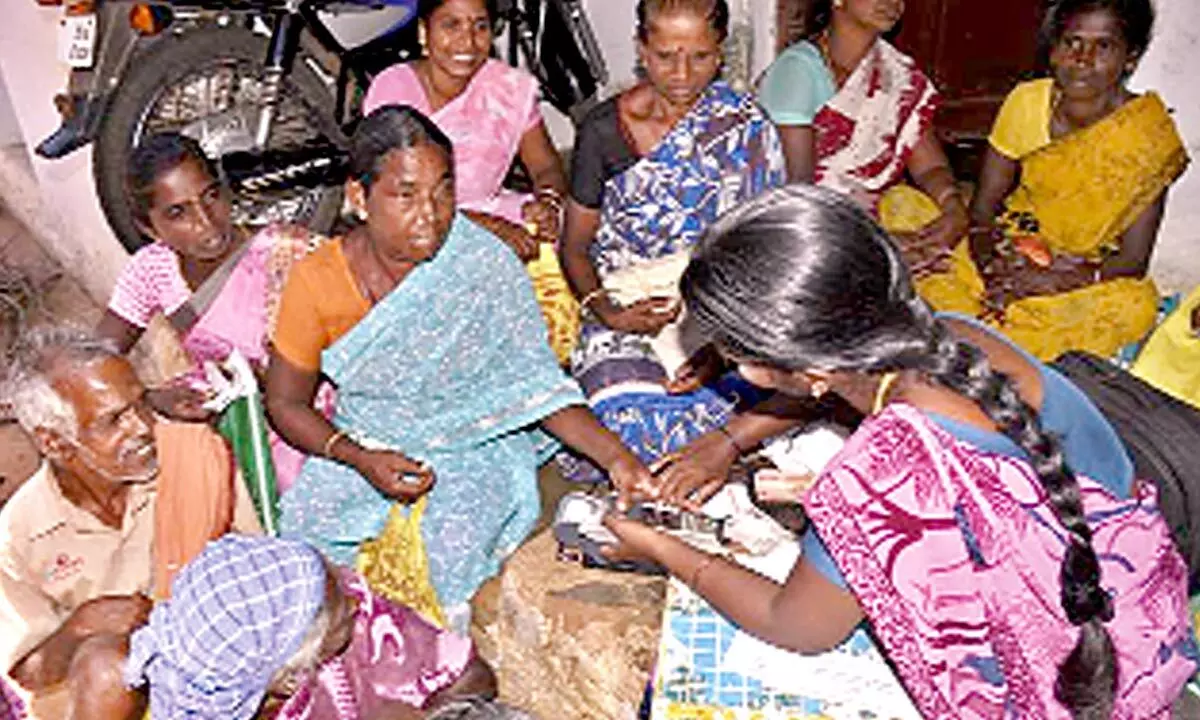Policy needed to reserve 30% banking correspondents jobs for women: SBI
Women agents consist of less than 10% of the total Business Correspondents (BC) work force today
image for illustrative purpose

Policy may also be framed to mandatorily recruit at least 30% of the total workforce as women BCs, particularly in locations where access and usage of the accounts by women is low. This will clearly bridge the gender gap. A central pool may be created containing details of all such Bank Sakhis. As an enabler, provisions to be made in NRLM/NULM site for uploading Bank Sakhis information which may be accessed by banks and BCs for engaging as CSPs
Mumbai: Analysts have raised a demand for having 30 per cent women banking correspondents in India. Popularly known as 'Banking Sakhis' the women banking correspondents comprise merely 10 per cent of the Business Correspondents (BC) folks in the country at the moment.
The bidirectional relationship between economic development and women's empowerment, defined as improving the ability of women to access the constituents of development with thrust on identical representation across multiple pivots, can have a fulfilling proposition through making structural reforms in the banking correspondents' ecosystem.
One such earliest initiative in the direction of empowering women with scale benefits was the introduction of PMJDY. Of the total 45.2 crore accounts opened till date, a whopping 55 per cent of the account holders are women. The stupendous success of PMJDY is primarily due to Business Correspondents (BCs) model that has off late taken centre stage in delivery of financial services in rural areas. Number of BCs has witnessed a massive growth in the last few years, but has been contributed largely by the private sector who have however shown a lower commensurate interest in the PMJDY accounts opening and adoption (less than 3 per cent) thereby the interoperability of ecosystem/enabling infrastructure has unintentionally become payments accretive only, without bringing any meaningful value to account holders in driving home financial literacy in true essence.
When considering the ability of BCs to positively impact the financial inclusion of 25 crore (and, counting upwards) women Jan Dhan account holders, the 'gender' of the agent, the face connecting the myriad world of finance to doubtful, hesitant and low on even basic tenets of skills beneficiaries, almost an outlier juxtaposed against the constantly changing, unending financial landscape becomes a decisively important factor to proliferate and deepen the financial inclusion drive. Global Findex report 2017 divulged that majority of women PMJDY accounts remain inoperative, says an internal economic research report by SBI.
Women agents consist of less than 10 per cent of the total BC work force today. The problem is more accentuated in northern, eastern and central states, accommodating the bulk of population bulge as also harbouring close to two-third share in total BC network but falling quite short in better representation of women agents, which can alter the socio-economic fabric of these areas considerably and meaningfully if more women find foothold in BC ecosystem, becoming the changelings.
The southern states fare better on this parameter, reflecting the better digital literacy proliferating to bottom of the pyramid, now being leveraged at grassroot levels. Women BC agents bring more transparency into the system, build more rapport with diverse customer groups, and promote a demand driven incremental revenue while giving a push to small savings scheme and social security offerings.
Under DAY-NRLM, GoI launched an ambitious program "Mission One GP One BC Sakhi", targeting creation of a pool of 1.25 lakh trained and certified women SHG members as BC Sakhi. Conceptualized in mid-2019, the outreach program envisaged annual creation of 50,000 odd BC Sakhis each year, reaching the ambitious goal within three years, building on the pitch prepared earlier by DFS nudging all banks to deploy women SHG members as Business Correspondents in the allotted sub service areas, as per their requirements. SRLMs of states were given the responsibility to set the wheels in motion. Even with the onset of pandemic, certain states like Uttar Pradesh did a phenomenal job, bringing into the loop tens of thousands of educated SHG women members, making them future-ready through necessary training and imparting skill-sets who, in turn, helped usher in a silent revolution through contact intensive field visits in the hinterland, building bridges of confidence and mutual trust.
"We thus recommend that Bank Sakhis hired under NRLM may be considered for appointing as BCs, as they are well versed with routine bank operations and possess mandated IIBF certification," says Soumya Kanti Ghosh, SBI group's chief economic advisor.
Policy may also be framed to mandatorily recruit at least 30 per cent of the total workforce as women BCs, particularly in locations where access and usage of the accounts by women is low. This will clearly bridge the gender gap. A central pool may be created containing details of all such Bank Sakhis. As an enabler, provisions to be made in NRLM/NULM site for uploading Bank Sakhis information which may be accessed by banks and BCs for engaging as CSPs. Reserving at least 30 per cent of BCs for women in future can have three profound implications for the banking system apart from bolstering the women participation in labour force. First, all customers feel that female BC agents have more patience and are more willing to address queries or explain product features.
In addition, female customers are willing to share their family's financial needs more openly with female BC agents. Second, female BC agents bring similar or more business and might serve more of the underserved. Female BC agents play a critical role in deepening financial inclusion. They are more likely to serve customers in remote areas, elderly customers, and other underserved customers. Third, Women agent networks could offer a mix of advantages, such as encouraging savings among women, onboarding more first-time female users, low-value but high-frequency transactions, and doorstep delivery of financial services.

